constituent assembly of india debates (proceedings)- volume vii
constituent assembly of india debates (proceedings)- volume vii
constituent assembly of india debates (proceedings)- volume vii
You also want an ePaper? Increase the reach of your titles
YUMPU automatically turns print PDFs into web optimized ePapers that Google loves.
extremity which is inhabited by Lakher tribesmen, the rest <strong>of</strong> the district is inhabited by the tribes known<br />
as Lushai or Mizo and found elsewhere in North Cachar sub-division, and Manipur as Kuki. The<br />
communications with the main inhabited areas <strong>of</strong> Aijal (headquarters) and Lungleh are difficult and there<br />
is only a bridal path connecting Aijal with Silchar. From Serang, near Aijal, communication by river, along<br />
the Dhaleswari, is possible and Demagiri in the south is connected with Rangamati in the Chittagong Hill<br />
Tracts, by the Karnaphuli river. There is also a bridal path connecting Lungleh with Rangamati. The<br />
population <strong>of</strong> this district is 152,786 according to the last census and over 96 per cent <strong>of</strong> the population<br />
is tribal. The district as a whole is hilly, with a general elevation <strong>of</strong> between 3,000 and 4,000 feet and the<br />
slopes are usually quite steep.<br />
Jhuming, with the exception <strong>of</strong> certain orange gardens, is the common form <strong>of</strong> cultivation, and<br />
terracing and wet cultivation present many difficulties. Spinning and weaving is a common cottage<br />
industry, and every woman in a Lushai household spins and weaves for the needs <strong>of</strong> the family. Most<br />
attractive tapestry work is done in these hills and the designs make a very colourful display. Much <strong>of</strong> the<br />
weaving and spinning is done however for personal use and not for sale. The degree <strong>of</strong> literacy in the<br />
area is very high; the reason for it being probably the fact that a large proportion <strong>of</strong> the population is<br />
Christian and the Sunday Schools have assisted the spread <strong>of</strong> literacy even among the adult men but,<br />
apart from a few Government servants, the number <strong>of</strong> people following non-agricultural occupations is<br />
negligible. The general level <strong>of</strong> intelligence and civilised behaviour in this area is high and compares<br />
favourably with most places in the plains.<br />
There are no local self-governing institutions and village life is to a great extent dominated by the<br />
chief who is generally hereditary*. Formerly the number <strong>of</strong> chiefs was small, probably 50 or 60, but on<br />
account <strong>of</strong> the increase in population and the growth <strong>of</strong> new villages the present number is over 300. The<br />
chiefs settle disputes in the village, make a distribution <strong>of</strong> land for jhuming and generally carry out any<br />
orders issued to them by the <strong>of</strong>ficials including such work as collection <strong>of</strong> taxes. Of late the relations<br />
between the chiefs and the people has been rather strained, and it would appear that one reason for this<br />
is the convening <strong>of</strong> the so-called District Conference by the Superintendent <strong>of</strong> the Lushai Hills. The "Mizo<br />
Union" was started sometime ago by the people (including chiefs also as members) as a non-<strong>of</strong>ficial<br />
organisation, with the consent <strong>of</strong> the Superintendent. This organisation seems to have been without a<br />
rival to begin with but in 1946 the Superintendent convened the District Conference with a membership<br />
<strong>of</strong> 40 <strong>of</strong> which 20 were commoners and 20 were chiefs. The District Conference was supposed to be<br />
elected by household franchise at the rate <strong>of</strong> one voter for every 10 houses and in the first conference,<br />
the chiefs and the people had separate electorates, that is the people elected their own representatives<br />
and the chiefs theirs. The conference apparently created little enthusiasm and the large representation <strong>of</strong><br />
chiefs on it must have caused some dissatisfaction. The Superintendent was the President <strong>of</strong> the<br />
conference. Towards October 1946 this conference seems to have broken down and was virtually<br />
abandoned. Shortly before the visit <strong>of</strong> the Sub-Committee however fresh elections were held by the<br />
Superintendent. At this election a change was made in the franchise so that the separate electorate was<br />
abolished and chiefs and commoners voted jointly. The ratio <strong>of</strong> chiefs and commoners was however<br />
maintained and on this account the "Mizo Union" decided to boycott the elections with considerable effect<br />
on it. In fect it is claimed by the Mizo Union that only two or three hundred voters actually took part in<br />
the elections. However this might be, the convening <strong>of</strong> the District Conference which was claimed to be<br />
an elected body obviously brought it into rivalry with the Mizo Union, and since the conference was<br />
supported by the Superintendent, the Mizo Union incurred <strong>of</strong>ficial disfavour!. The Superintendent being<br />
the President <strong>of</strong> the conference and the chiefs being largely under <strong>of</strong>ficial control and influence, there<br />
was apparent justification for the suggestion that the District Conference was not representative <strong>of</strong> the<br />
views <strong>of</strong> the people. In fact the attitude <strong>of</strong> the Superintendent gave us very good reason to believe that<br />
the District Conference was completely dominated by him and was his mouthpiece. The Superintendent<br />
himself propounded a scheme before the Committee the purport <strong>of</strong> which was that all local affairs should<br />
be managed by a constitutional body elected by the district who would have their own <strong>of</strong>ficers appointed<br />
by themselves and that the Government <strong>of</strong> Assam or <strong>of</strong> the Union should pay only a certain sum <strong>of</strong><br />
money amounting to the deficit <strong>of</strong> the district and enter into an agreement regarding the defence <strong>of</strong> the


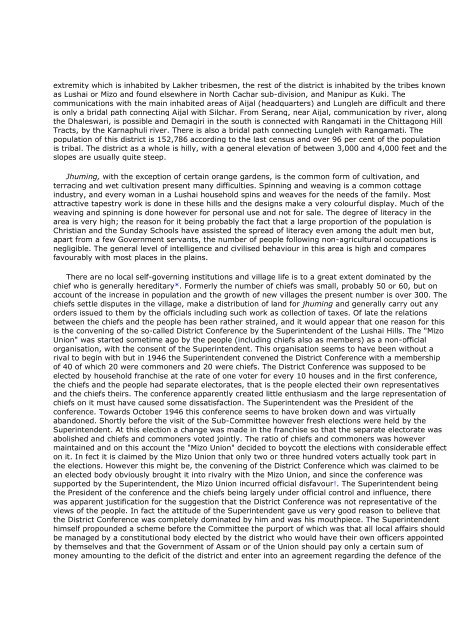
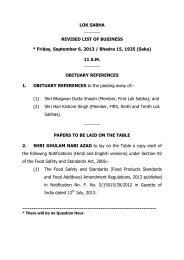
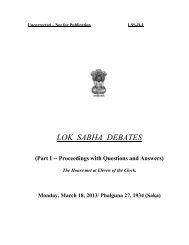
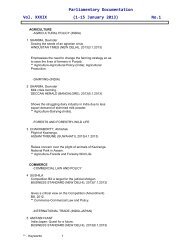
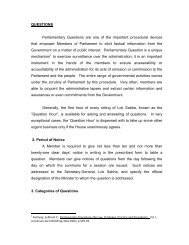
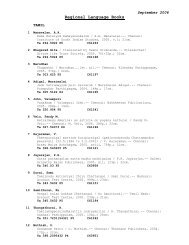
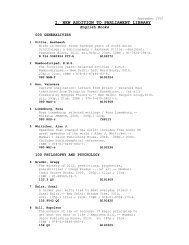
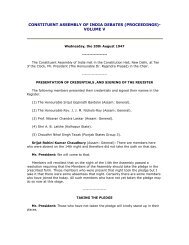
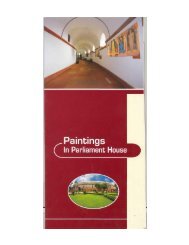
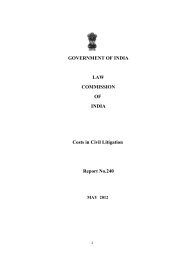
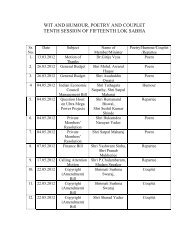
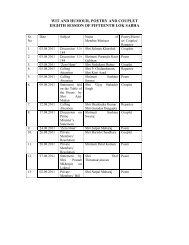

![gÉÉŌ A.]ÉŌ. xÉÉxÉÉ](https://img.yumpu.com/8015720/1/190x245/geeo-aeo-xeexee.jpg?quality=85)
